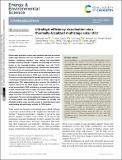Ultrahigh-efficiency desalination via a thermally-localized multistage solar still
Author(s)
Xu, Zhenyuan; Zhang, Lenan; Zhao, Lin; Li, Bangjun; Bhatia, Bikramjit S; Wang, Chenxi; Wilke, Kyle L.; Song, Youngsup; Labban, Omar; Lienhard, John H; Wang, Ruzhu; Wang, Evelyn; ... Show more Show less
Downloadc9ee04122b.pdf (4.029Mb)
Publisher with Creative Commons License
Publisher with Creative Commons License
Creative Commons Attribution
Terms of use
Metadata
Show full item recordAbstract
Passive vapor generation systems with interfacial solar heat localization enable high-efficiency low-cost desalination. In particular, recent progress combining interfacial solar heating and vaporization enthalpy recycling through a capillary-fed multistage architecture, known as the thermally-localized multistage solar still (TMSS), significantly improves the performance of passive solar desalination. Yet, state-of-the-art experimental demonstrations of solar-to-vapor conversion efficiency are still limited since the dominant factors and the general design principle for TMSS were not well-understood. In this work, we show optimizing the overall heat and mass transport in a multistage configuration plays a key role for further improving the performance. This understanding also increases the flexibility of material choices for the TMSS design. Using a low-cost and free-of-salt accumulation TMSS architecture, we experimentally demonstrated a record-high solar-to-vapor conversion efficiency of 385% with a production rate of 5.78 L m−2 h−1 under one-sun illumination, where more than 75% of the total production was collected through condensation. This work not only significantly improves the performance of existing passive solar desalination technologies for portable and affordable drinking water, but also provides a comprehensive physical understanding and optimization principle for TMSS systems.
Date issued
2020-01Department
Massachusetts Institute of Technology. Department of Mechanical Engineering; Massachusetts Institute of Technology. Department of Chemical EngineeringJournal
Energy & Environmental Science
Publisher
Royal Society of Chemistry (RSC)
Citation
Xu, Zhenyuan et al. "Ultrahigh-efficiency desalination via a thermally-localized multistage solar still." Energy & Environmental Science 13, 1 (January 2020): c9ee04122b © 2020 Royal Society of Chemistry
Version: Final published version
ISSN
1754-5692
1754-5706